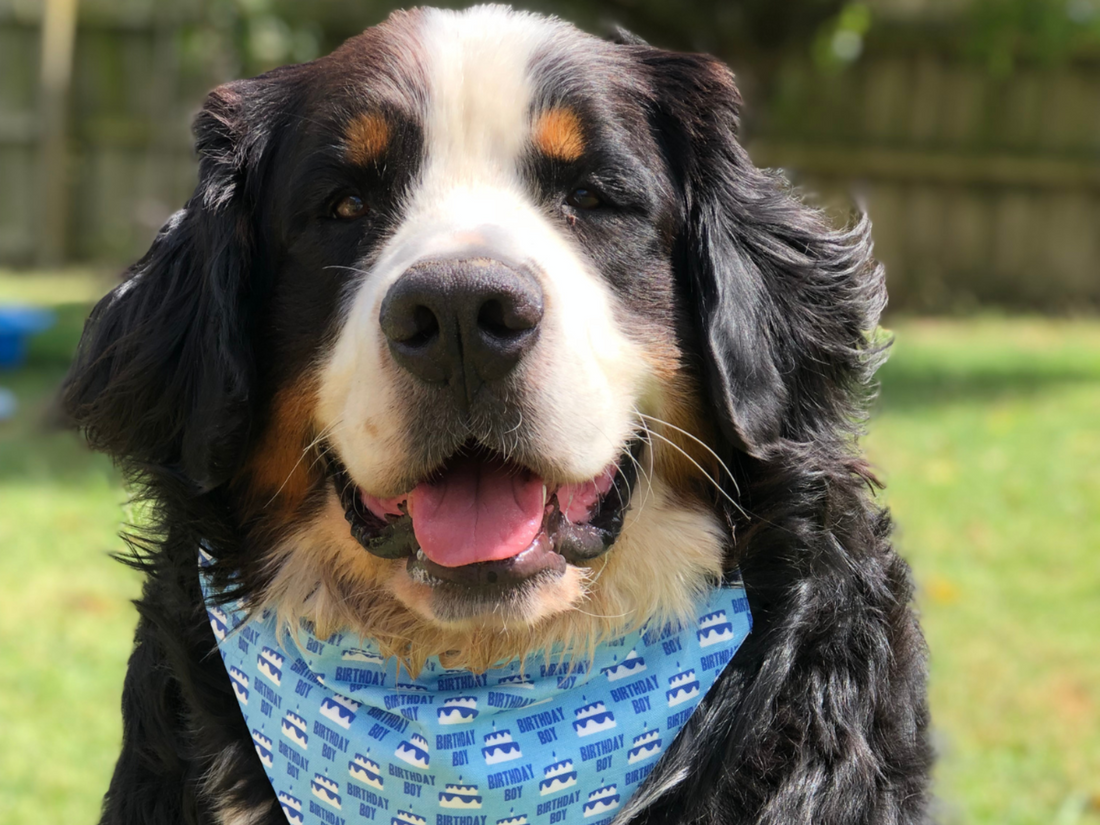
The Ultimate Guide to Bernese Mountain Dogs: History, Characteristics, and Care
Share
The Bernese Mountain Dog is a beloved breed known for their friendly and gentle nature. Originally bred in Switzerland as a working dog, they have become popular family pets around the world. In this guide, we'll explore the history and characteristics of the Bernese Mountain Dog, as well as provide tips for keeping them healthy and happy.

History of Bernese Mountain Dogs.
Bernese Mountain Dogs have a long and rich history dating back to the Swiss Alps. They were originally bred as working dogs, used for tasks such as herding cattle, pulling carts, and guarding farms. The breed's name comes from the Canton of Bern, where they were most commonly found. Despite their popularity in Switzerland, it wasn't until the 20th century that Bernese Mountain Dogs began to gain recognition in other parts of the world. Today, they are beloved family pets and continue to be used for working purposes in some areas.
Characteristics and temperament of Bernese Mountain Dogs.
Bernese Mountain Dogs are known for their friendly and affectionate nature. They are loyal and devoted to their families, and are often described as gentle giants. They are also intelligent and eager to please, making them relatively easy to train. However, they can be stubborn at times, so consistent training and positive reinforcement are important. Bernese Mountain Dogs are also known for their love of the outdoors and are happiest when they have plenty of space to run and play. They are generally good with children and other pets, but early socialisation is important to ensure they develop good manners and behaviour. Remember that they grow into large dogs, so dont let them on the bed as a puppy if you don’t want them on the bed when they are fully grown 🤣

Proper care and grooming for Bernese Mountain Dogs.
Bernese Mountain Dogs have a thick, double coat that requires regular grooming to keep it healthy and free of mats and tangles. Brushing their coat at least once a week is recommended, and more frequent brushing may be necessary during shedding season. They also need regular baths to keep their coat clean and shiny. In addition to grooming, proper care for Bernese Mountain Dogs includes regular exercise, a healthy diet, and regular visits to the vet for check-ups and preventative care. It's important to monitor their weight, as they can be prone to obesity, and to provide them with plenty of mental stimulation to prevent boredom and destructive behaviour.
Common health issues and how to prevent them.
Like all breeds, Bernese Mountain Dogs are prone to certain health issues. Some of the most common health problems in this breed include hip and elbow dysplasia, bloat, and cancer. To prevent these issues, it's important to choose a reputable breeder who screens their dogs for genetic health problems. Additionally, providing your Bernese Mountain Dog with a healthy diet, regular exercise, and preventative care from a veterinarian can help keep them healthy and prevent these issues from developing. It's also important to be aware of the signs of these health problems and seek veterinary care promptly if you notice any symptoms. It is also quite common for this breed to have allergies. A good diet can really help. Anallergenic Dry Dog Food is really good for allergies. You can even add some sardines to their meal twice a week to help skin issues etc.
You may also have noticed that most Bernese Mountain Dogs love food and will scoff it down in seconds. We highly recommend investing in a good slow feeder bowl to help slow down their eating. Slow feeders avoid gagging on food causing vomiting, helps prevent the risk of bloat, provides mental stimulation and reduces food aggression. We highly recommend the Scream® Slow Feed Interactive bowl or for something fun, the happy hamburger bowl or the happy bowl ice-cream.
Training and socialisation tips for Bernese Mountain Dogs.
Bernese Mountain Dogs are intelligent and eager to please, making them relatively easy to train. However, they can also be stubborn at times, so it's important to use positive reinforcement techniques and be patient and consistent in your training. Socialisation is also important for Bernese Mountain Dogs, as they can be wary of strangers and other dogs if not properly socialised from a young age. Exposing them to a variety of people, animals, and environments can help them become well-adjusted and confident adults. Consider enrolling your Bernese Mountain Dog in obedience classes or working with a professional trainer to ensure they receive proper training and socialisation.

Comparing Bernese Mountain Dogs to Other Large Breeds.
While there are many large dog breeds out there, Bernese Mountain Dogs have some unique characteristics that set them apart. For one, their distinctive tri-color coat and long, silky fur make them stand out in a crowd. Additionally, their gentle and affectionate temperament makes them great family pets, while their intelligence and trainability make them suitable for a variety of tasks. While other large breeds may share some of these traits, the combination of characteristics that Bernese Mountain Dogs possess make them truly unique.
When comparing Bernese Mountain Dogs to other large breeds, it’s important to note that they are not the most active or energetic dogs. While they do enjoy a good romp in the yard or a long walk, they are not as high-energy as breeds like the Great Dane or the Boxer. However, their calm and gentle nature makes them great with children and other pets, and they are known for being excellent therapy dogs.
How to Train Your Bernese Mountain Dog: Tips and Tricks
The Bernese Mountain Dog is a large, friendly breed that is known for its loyalty and affectionate nature. Training your Bernese Mountain Dog can be a fun and rewarding experience, but it's important to use effective techniques to ensure your pup thrives. From basic obedience to advanced tricks, there are many ways to help your Bernese Mountain Dog become a well-behaved and happy companion.

Start with Basic Commands.
When training your Bernese Mountain Dog, it's important to start with basic commands such as sit, stay, come, and heel. These commands will form the foundation for more advanced training later on. Use positive reinforcement techniques such as treats and praise to encourage your pup to follow your commands. Consistency is key, so make sure to practice these commands regularly and in different environments to help your Bernese Mountain Dog generalise the behavior.
Use Positive Reinforcement.
Bernese Mountain Dogs are easy to train. They’re calm and confident and love making their owners proud. However, Berners can get their feelings hurt easily, so harsher training methods aren’t recommended. Positive reinforcement is one of the most effective training techniques for Bernese Mountain Dogs. This involves rewarding your pup with treats, praise, or playtime when they exhibit good behavior. By rewarding your dog for doing something right, they are more likely to repeat that behavior in the future. Avoid using punishment or negative reinforcement, as this can lead to fear and anxiety in your dog. Instead, focus on positive reinforcement to create a happy and well-behaved Bernese Mountain Dog. If you need some training treats we recommend our healthy dog treats which are Australian made, healthy premium quality treats for your dogs. Just like human food, real treats will keep your pets fuller for longer, and are packed with vitamins & minerals that processed 'cheap' treats do not have.
Socialise Your Bernese Mountain Dog.
Socialisation is an important aspect of training your Bernese Mountain Dog. This involves exposing your pup to different people, animals, and environments in a positive and controlled manner. Socialisation helps your dog develop confidence, reduces fear and anxiety, and improves their overall behavior. Take your pup to puppy classes, dog parks, and other social events to help them interact with other dogs and people. Remember to always supervise your dog during socialisation and reward them for good behavior.

Provide Plenty of Exercise and Mental Stimulation.
Bernese Mountain Dogs are moderately energetic, preferring 20-30 minutes per day of daily exercise. They need room to roam, so having an outdoor fenced space is recommended, though they’ll primarily want to be inside next to you when you’re home. Bernese Mountain Dogs also require plenty mental stimulation to stay healthy and happy. You can engage them in games like fetch, tug-of-war, and hide-and-seek to provide mental stimulation. Puzzle toys and interactive games can also help keep your pup mentally engaged and prevent boredom. Remember to always supervise your dog during exercise and playtime to ensure their safety.

Seek Professional Help if Needed.
While training your Bernese Mountain Dog can be a fun and rewarding experience, it’s important to recognise when professional help may be needed. If your pup is exhibiting aggressive behavior, excessive barking, or other concerning behaviors, it may be time to seek the help of a professional dog trainer or behaviorist. They can provide personalised training plans and techniques to address specific issues and help your pup thrive. Don’t hesitate to reach out for help if needed – it’s always better to address behavior issues early on before they become more difficult to manage.

